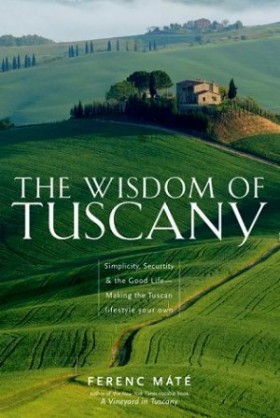The Death of the Idyll
Travel Books: Frank Bures on "The Wisdom of Tuscany" and the last, dying gasp of a travel book genre
11.13.09 | 10:54 AM ET

For many years now, the northern edge of the Mediterranean has been besieged by Anglophones searching for the good life. First Peter Mayle settled in Provence. Then Tim Parks met his neighbors in Verona. Frances Mayes looked up in the sky near Florence. And Chris Stewart ran over some fruit in Spain. The list goes on. As Matthew Kneale recently pointed out in the Financial Times, the tradition of what he calls “idyll memoirs” may go back even further.
Yet it is this most recent spate of blockbusters that has sent a frenzy of discontented Americans and Brits to sunnier climes. Now, perhaps mercifully, that era is coming to an end. With the publication of Ferenc Máté‘s new book, The Wisdom of Tuscany: Simplicity, Security & the Good Life—Making the Tuscan Lifestyle Your Own, it’s all but official. The idyll is over.
The dream was harmless enough: A sunny fantasy to pass the day at the office. Somewhere out there was a warmer, more human place with no treadmill, no rat race, no endless corporate ladder. Just wine and vine-ripened tomatoes and a house in the hills. Simple. Full. Satisfying.
Having lived in Italy myself, I know there is much to love about the country, and I was happy to see how this trend changed the world’s impression of it. These accounts were amusing escapes.
Yet at the same time, I was a little annoyed, because I knew there was more to the idyll than met the eye. I saw this, ironically, last summer, when one of my old classmates from Bologna came with his girlfriend to visit us in America.
“So,” his girlfriend said as we drove through the streets of my city, “this must be the part of town where the important people live?”
“No,” I said, “This is just a normal part of town. These are normal houses.”
“But,” she exclaimed, “look at all them! They’re so beautiful. Look at the yards. It’s just like in a movie!”
The trip went on like that, with one discovery after another of the magic and charm and (dare I say) wisdom of America, along with asides about how much better it was here than in Italy.
I never had the heart to tell her that, yes, it was like a movie here, but where they again were watching It’s a Wonderful Life, I was seeing a mix of Fargo, Short Cuts and American Movie. Which is just to state the obvious: that there are many layers beneath the facade. Good travel writing, I think, strives to get down to, or at least acknowledge, those layers.
“The Wisdom of Tuscany” is not a book troubled by such matters, and Máté, who wrote his own idyll book a decade ago (The Hills of Tuscany), shows no desire to go beyond the caricature of Italian life, of which we have already heard too much. In fact, it is not so much a book as it is a pastiche of impressions and anecdotes about himself going to the market, staring out over the hills, thinking about all the trouble caused by our North American way of life, and reflecting on the wisdom imparted to him by his neighbors, who live in a kind of heaven on earth to which we all should aspire.
“When I mention Tuscany to outsiders, the response is usually a wistful sigh,” he writes.
It’s likely, however, that they are sighing because they are tired, since Máté has taken the idyll genre to its logical conclusion. He has turned our Italian affair into a service piece. He has merged travel with self-help. The book is arranged by chapters centered on Máté‘s forced musings, with titles like, “Close to Nature,” “Getting a Life,” and “Your Own Tuscany.” The book is full of vague anti-corporate rants and armchair social science, and bizarre pronouncements like, “Tuscans strive for quality even in daily items,” and “[T]here is the sense of security and tranquility instilled by Italy’s medical system.”
All of which is to say that in Máté‘s world, all that is perfect in Tuscany is all that is wrong with our own society, and this has the ring of untruth to it. Surely there are things we could learn from Italy, and probably from every country. But this kind of simple-minded Italophilia is painful stuff at this point, and demonstrates how the genre has exhausted itself, and from now on can be little more than a self-mocking cliche.
To fall in love with a fantasy is one thing. But reality is another, and it will eventually make itself known. I love Italy too, and agree with many of Mate’s points. But Italy is also a dark and complicated place, as are all places if you care to look. And while there is surely much wisdom to be found in the hills of Tuscany, there is also much foolishness.
And that is what I love most of all.![]()